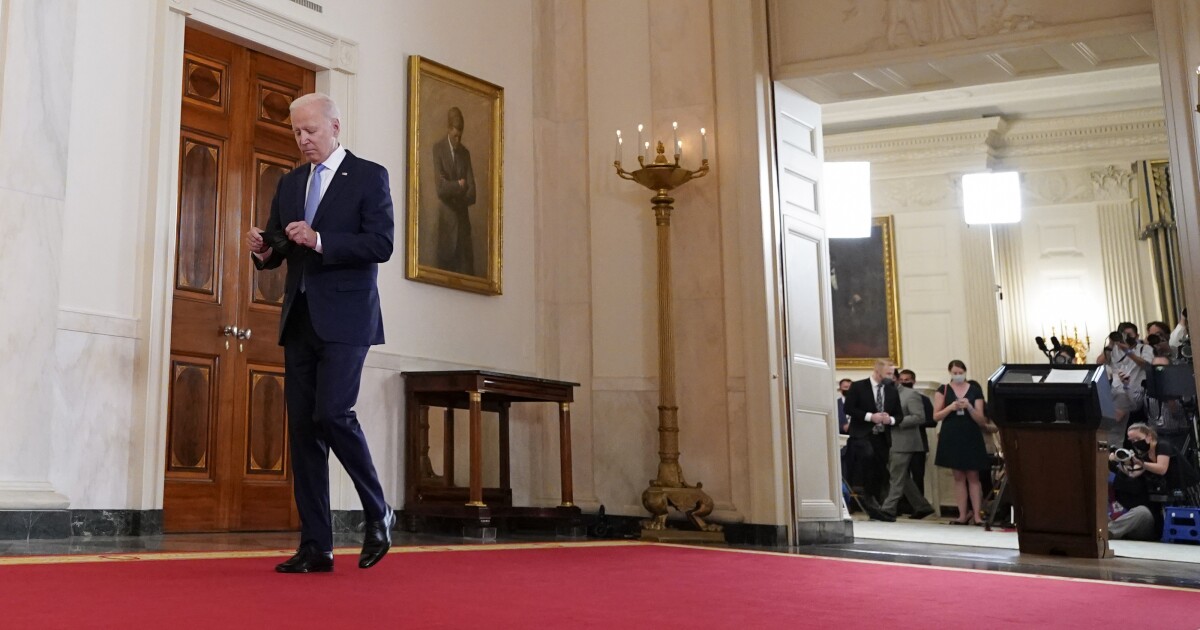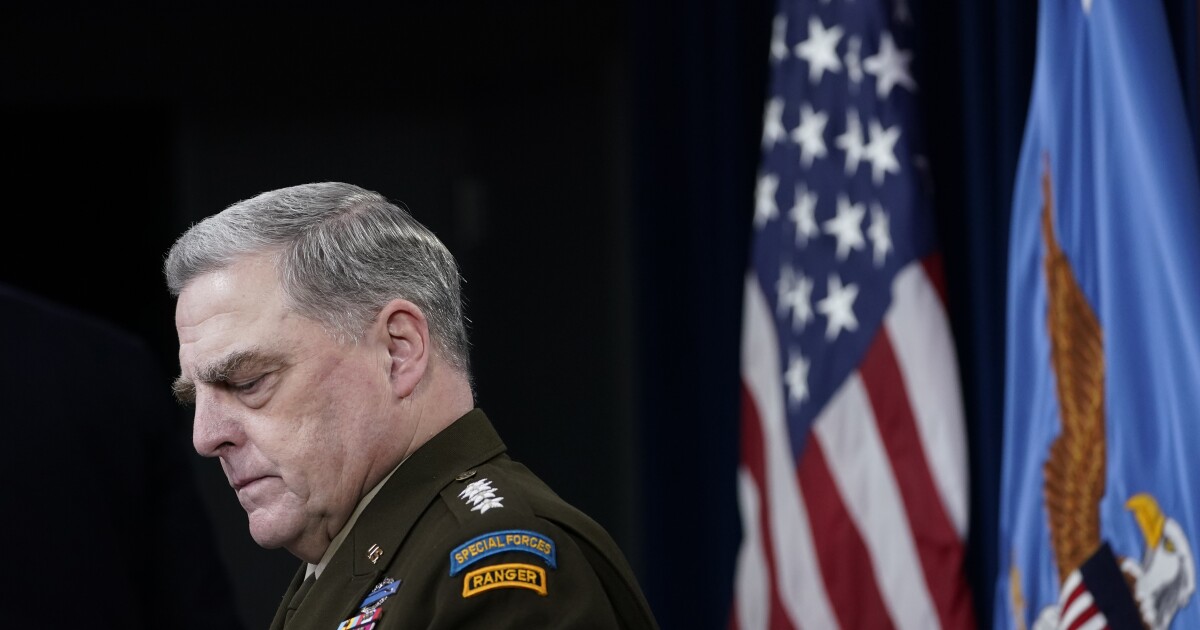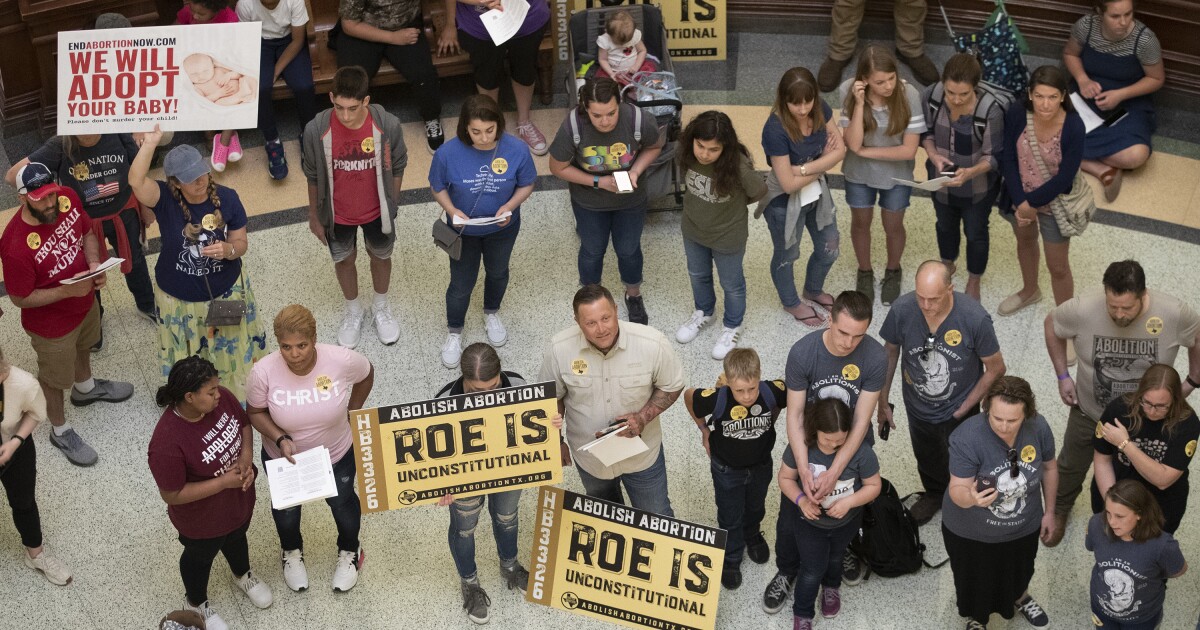Biden, facing challenges of his own, to host Ukraine’s Zelensky

When Ukraine’s President Volodymyr Zelensky arrives at the White House on Wednesday, he will be just the second European head of state to sit with President Biden in the Oval Office — a sign, administration officials say, of the importance Biden places on protecting the 30-year-old democracy from Russian aggression.
But the meeting, which was quietly pushed back two days as Biden focused on the final withdrawal of U.S. forces from Afghanistan and the impact of a major hurricane, comes at a moment when evidence of America’s inward turn and its shrinking influence around the world is unavoidable.
In remarks Tuesday marking the end of 20 years of conflict in Afghanistan, Biden espoused something of a foreign policy doctrine, stating that the “fundamental obligation of a president … is to defend and protect America, not against the threats of 2001 but the threats of 2021 and tomorrow,” and suggesting the $2.3-trillion U.S. investment in that country cost the United States countless “opportunities” and “was no longer in the vital national interests of our people.”
For all of Biden’s impassioned rhetoric about the importance of democracies prevailing over autocracies, his desire to reassert American leadership around the world has been tempered by an acceptance of geopolitical realities and a determination to reduce America’s military footprint abroad while focusing on an economic recovery program at home. He is also seeking to pivot U.S. foreign policy from the quagmire of the Middle East and Afghanistan to confront the rising threat of a new world power in Beijing. Those changes in focus, experts say, have frustrated long-standing allies and could stymie Zelensky’s efforts to build deeper ties with Washington.
“The reality of the Biden administration is more unilateralism, and more domestic focus than a lot of allies had expected,” said Ian Bremmer, president of the Eurasia Group, a global risk assessment firm. “And the timing of Zelensky’s visit amid the turbulence of the Afghanistan drawdown could not be worse.”
Zelensky, a former comedian, is already something of a household name in Washington, having played involuntary roles in former President Trump’s first impeachment trial and then in the bruising 2020 election campaign. He was the unhappy and rather bewildered recipient of the infamous telephone call in which Trump threatened to cut off military aid to Ukraine unless Zelensky dug up dirt on Biden, a Democratic political rival who as vice president led U.S. efforts to push Ukraine to clean up corruption.
The Ukrainian president arrived in Washington earlier this week eager to turn the page and to win commitments from Biden for economic and military support in his country’s ongoing conflict with Russia. Moscow has occupied part of its territory, the Crimean peninsula, since 2014 and is backing separatists fighting in an eastern region of the country.
Although Biden’s ascent to the White House has meant relief from Trump’s bruising pressure tactics, his administration has still frustrated Kyiv. Ukrainian officials are most upset about Biden’s recent decision not to sanction Germany and other European entities for their role in constructing a Russian pipeline that will conduct Russian gas to Germany.
This was widely seen as a boon for Moscow, as Europe increases its reliance on Russian gas, and a slap at smaller countries like Ukraine that stand to lose out on energy revenues. Biden said that while he hated the pipeline project, Nord Stream II, it was already 95% completed when he took office and it would be better to monitor and restrict it than to punish Germany, with whom he wanted to repair ties damaged during the Trump administration.
“They feel like the administration crossed them on this and owes them,” said John Herbst, a former U.S. ambassador to Ukraine who’s now head of the Eurasia Center at the Atlantic Council, a nonpartisan think tank in Washington.
The White House notes that Biden has given Zelensky and Ukraine what one senior administration official said was “as much, if not more, attention … than any other European country.” The official, who spoke on condition of anonymity to preview the meeting, pointed to a defense package agreement between the two countries that will be updated this week, and to the $150 million in security aid the U.S. sent to Ukraine in June, which included armed patrol boats and counter-artillery radars.
Secretary of State Antony J. Blinken traveled to Kyiv in May to meet with Zelensky, and the Ukranian leader and Biden have spoken twice by phone, including on the eve of Biden’s meeting with Vladimir Putin in Geneva.
In another sign of the U.S. commitment to Ukraine, the official said, Biden intends Wednesday to sign off on new agreements that will include an additional $60 million in U.S. security aid for Ukraine and a pledge to boost trade.
The Pentagon will also sign a revised strategic defense framework to boost cooperation on matters such as Black Sea security, cybersecurity and intelligence sharing and continued military support in the face of Moscow’s show of force, the official said. Russia amassed troops along its border with Ukraine in May and has scheduled military exercises in the same area next month.
On the economic front, Biden and Zelensky plan to finalize an agreement on commercial cooperation with $3 billion in support from the Export-Import Bank of the United States.
Much aid to Ukraine, from the U.S. and European allies, has been conditioned on reforms that Zelensky has agreed to implement to fight corruption and improve the national judiciary. Though he got off to a good start after taking office in May 2019, the last couple of years have been disappointing, Herbst said. Zelensky is pushing legislation that aims to improve Ukraine’s national security agency and has recently fired two judges, appointed by his predecessor, who’d sought to nullify his government’s fight against corruption.
“It’s been a mixed picture, and not one that would justify a major new commitment in economic aid,” Herbst said.
Steven Pifer, who served as U.S. ambassador to Ukraine during the Clinton administration and is now a senior fellow at the Brookings Institution, said he hopes “Zelensky comes with a plan for domestic reform,” a move that would probably earn a stronger commitment from Biden for financial and military assistance.
It’s not just Zelensky who stands to benefit from the meeting, which is scheduled to take place in the afternoon. Biden is likely to showcase the encounter as a return to normality after weeks of crisis related to the chaotic U.S. pullout from Afghanistan. For that reason, he is likely to be as nonconfrontational as possible in the hopes of highlighting “his calm mastery of the international scene,” said Herbst, the longtime diplomat now at the Atlantic Center.
But Herbst warned that an earnest show of support for Ukraine won’t be enough to reassure European allies still steaming over Biden’s decision to announce the Afghanistan withdrawal without consulting them and the frantic 11th-hour rescue effort they were forced to support.
“I don’t think the allies will turn their backs on Biden, but they are very upset,” Herbst said. “They still want him to be the guy they thought he was, but they are having serious doubts.”



